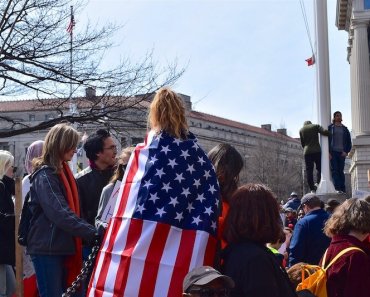A new research shows that the way young people consume news may make a difference in the way they participate in politics.
With the increasing selection of media platforms and information, news consumers are no longer limited to big media companies to learn what is happening around the world.
Therefore, to secure future audience groups, various media companies will naturally try to attract the Millennials and Generation Z, who will comprise more than one of three adult Americans by 2020 and 75 percent of the workforce by 2025, according to a Brookings report.
While looking into this topic, Sam Scovill, a sociology doctoral student at the University of Arizona, decided to explore how different ways young people consume media impact their level of political engagement.
“I think that young people in particular are a unique population, because they are digital natives, growing up with internet and social media as part of their education around information-seeking practices,” said Scovill.
“Additionally, the political participation habits that young people develop when they are in their first years of participating shape how they continue to participate as they age.”
The paper was recently presented at the American Sociological Association Annual Meeting in Philadelphia.
The study
The study is based on an analysis of the first wave of data from the Youth Participatory Politics dataset, which includes survey responses from a nationally representative sample of 2,920 respondents, ages 15-25.
The survey was conducted in 2011 by Knowledge Networks on behalf of Mills College.
Scovill looked at three different news selection methods.
- Those who choose an elite-selected method rely on news as presented in the mainstream media, chosen by a publisher or producer.
- Those who choose a socially-selected method rely on news through social networking sites, like Facebook and Twitter, as chosen by their friend groups.
- Those who choose a self-selected method rely on news that they selected themselves by actively and critically seeking information on topics that interest them from online-only sources, like YouTube or blogs.
Then, Scovill measured their level of political engagement in the following categories: voting, political activism and political campaigning.
While participants age 18 or older, who consumed elite-selected media, were the most likely to say they voted in the last election, those who consumed self-selected media were the most likely to participate in “high-cost” political activism or campaigning activities.
For example, they were more likely to attend a meeting or a rally for a candidate or issue, or to donate money to a campaign. They also were more likely to sign an online petition or attend a youth political event or protest.
Scovill explained this by identifying the first group as dutiful citizens and the second as engaged or actualized citizens.
While dutiful citizens tend to trust the mass media and see voting as their central and most important form of political engagement, engaged or actualized citizens tend to be more distrustful of mass media and are naturally more likely to participate in non-institutional forms of political engagement, such as protests or boycotts.
“So I think that more traditional media companies that attract older populations could do some work educating around how to think about and be critical of sources when engaging in information-seeking practices online,” said Scovill.
In addition, while those who consumed socially-selected news through social media were likely to have “liked” a political candidate on Facebook, getting news from social media did not have a significant impact on any of the categories measuring political engagement.
While the young people in the dataset generally had low news consumption, how they selected their news still made a difference in their political engagement.
“The overarching pattern was that people who are self-selecting and being intentional about their news consumption are also engaging in these more high-cost forms of activity,” Scovill said in a statement.
“That intentional process matters, whereas news on social media or elite-selected news media are coming through the choices of others who decide what is important to post on Facebook or what is important to go on the front page of the New York Times.”
The next step
Scovill plans to continue researching how young people’s political engagement differs from that of previous generations and how young people’s personal identity formation contributes to their political engagement.
“I’m particularly interested in Millennials and Generation Z because they get such a bad rap,” Scovill said in a astement.
“People do a lot of negative talk about them being disengaged and not caring, and while it’s true that voting numbers are down, people are engaging differently. Young people are using new forms of activism, like signing petitions online or doing their own crowdsourcing online and raising funds for things that matter to them, in ways that older generations might not be.”
Starting this fall, Scovill will explore the impact of partisanship on how young people think about which types of participatory politics to engage with.
Scovill has also begun collecting data on a qualitative project that will explore the role of youth empowerment organizations in political socialization processes.



